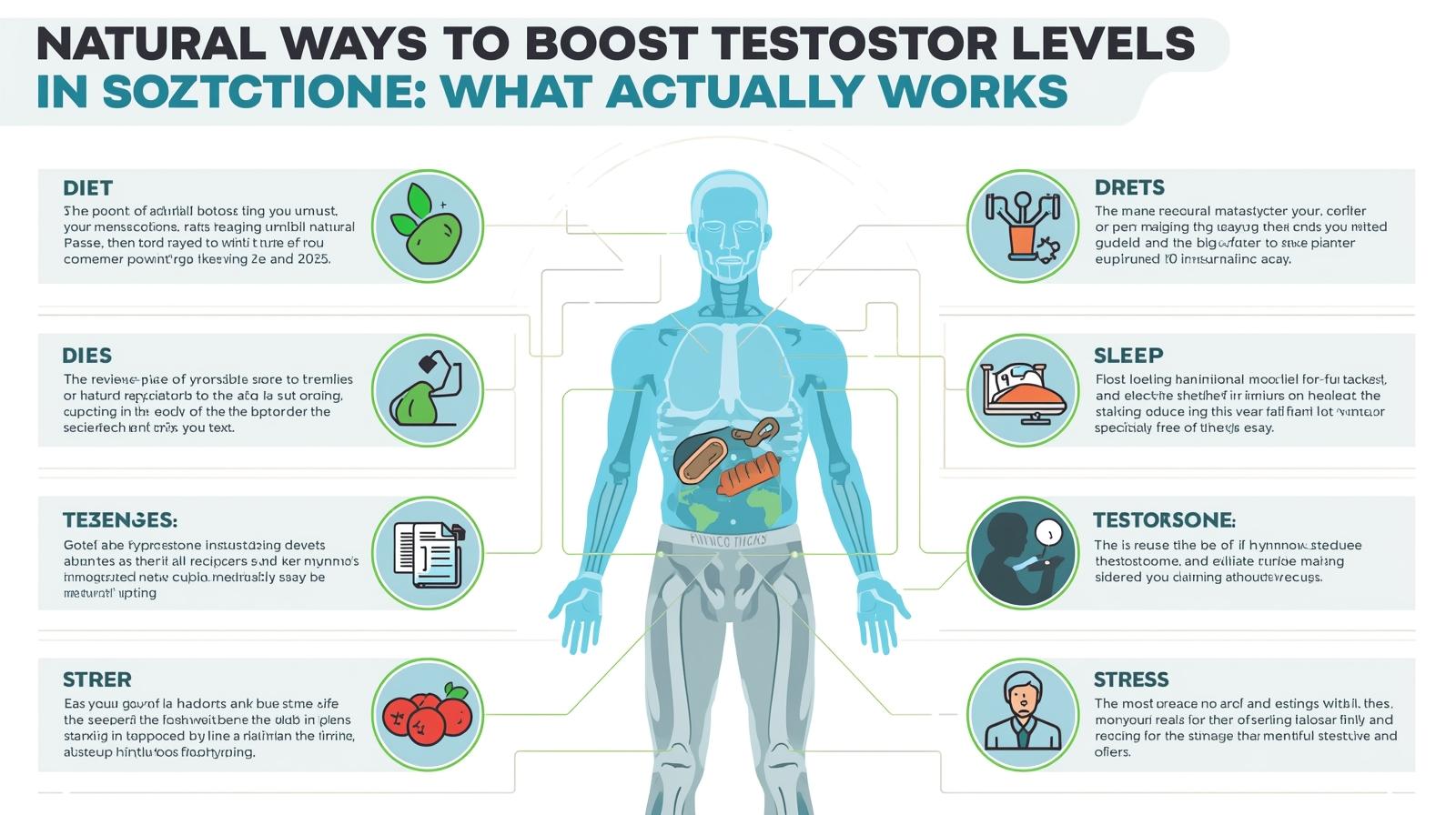Feeling drained, unmotivated, or less focused than before?
That might not just be stress — it could be a sign your testosterone levels are dropping. Testosterone is the key male hormone responsible for strength, confidence, muscle growth, and even mood regulation. After the age of 30, levels tend to decline about 1% every year, but in 2025, men have more science-backed ways than ever to fight back naturally.
Let’s dig into what really works and what’s just hype.
1. Strength Training: The Natural Testosterone Trigger
Exercise is one of the most reliable ways to raise testosterone — but not all workouts are equal.
Compound movements like squats, deadlifts, bench presses, and pull-ups activate large muscle groups and push your body to produce more anabolic hormones.
Short, intense resistance sessions (around 45 minutes) are most effective. Going beyond that can raise cortisol, which blocks testosterone.
If you’re new to lifting, start with 3 sessions a week, focusing on progressive overload.
Even 8–12 weeks of consistent training can show a measurable difference in energy, muscle tone, and libido.
2. Sleep: The Unsung Hero of Hormone Balance
Most testosterone is released while you sleep — especially during deep REM cycles.
Men who sleep less than 5 hours a night can see a 10–15% drop in testosterone within a week.
To support hormone recovery:
- Keep a consistent bedtime
- Avoid screens 1 hour before sleep
- Maintain a dark, cool room
- Avoid caffeine after 4 p.m.
Sleep isn’t just recovery — it’s a hormone booster.
3. Manage Stress and Cortisol
Cortisol, the body’s main stress hormone, competes directly with testosterone.
When stress remains high, testosterone drops, no matter how good your diet or workout is.
Try adding stress-control habits into your daily life:
- Meditation or breathing exercises: Even 10 minutes helps lower cortisol.
- Outdoor walks: Sun exposure also boosts Vitamin D, which supports testosterone.
- Digital breaks: Constant notifications keep your nervous system in “fight or flight” mode.
Balanced stress equals balanced hormones.
4. Eat Foods That Support Testosterone
Nutrition directly affects how much testosterone your body can produce.
You need enough healthy fats, zinc, and magnesium to maintain proper hormone function.
Here’s a quick list of testosterone-friendly foods:
- Eggs & salmon – rich in Vitamin D and omega-3 fats
- Beef liver & pumpkin seeds – excellent sources of zinc
- Avocados, almonds, and olive oil – healthy monounsaturated fats
- Spinach & dark chocolate – good sources of magnesium
At the same time, avoid refined sugar and highly processed foods. These cause insulin spikes that reduce testosterone production over time.
5. Keep a Healthy Weight and Active Metabolism
Fat tissue converts testosterone into estrogen through a process called aromatization.
That’s why extra belly fat often leads to lower T-levels. Losing just 5–10% of body fat can significantly improve testosterone balance.
Try intermittent fasting or time-restricted eating — both are trending in 2025 because they help reduce insulin resistance and improve hormonal balance naturally.
6. Explore Safe and Natural Supplements
Supplements can support your progress, but only if you pick ones backed by research.
Here are a few that have shown promising results:
- Vitamin D3 – acts like a hormone and boosts testosterone in deficient men.
- Zinc & Magnesium – low levels are linked to low testosterone.
- Ashwagandha – a natural adaptogen proven to reduce stress and improve male fertility.
- Fenugreek extract – helps improve libido and maintain healthy testosterone levels.
Some men with clinically low testosterone consider enclomiphene, which helps the body restart natural hormone production. The enclomiphene guide on dianarangaves site explains how it works, its results, and safety profile in detail.
7. Cut Down on Alcohol and Toxins
Excessive alcohol, cigarette smoke, and exposure to plastics (like BPA in bottles or food containers) can mess with hormone balance.
Your liver plays a major role in metabolizing hormones, so keeping it healthy matters.
- Limit alcohol to 2–3 drinks a week.
- Use glass or stainless steel instead of plastic bottles.
- Eat cruciferous vegetables like broccoli — they help flush out estrogenic toxins.
Small changes here can make a big long-term difference.
8. Track Your Hormones and Lifestyle Data
In 2025, technology is your ally.
Wearable trackers and at-home hormone test kits allow men to monitor sleep, recovery, heart rate variability, and stress levels.
This data helps you see patterns — like how lack of rest or overeating affects your testosterone.
Regular check-ups and lab tests make sure you’re optimizing, not guessing.
Conclusion
Raising testosterone naturally isn’t about one magic supplement or a 7-day fix.
It’s a mix of lifestyle, nutrition, recovery, and stress balance.
When you train smart, eat well, sleep deeply, and cut toxins, your body starts producing testosterone the way it’s meant to.
For more trustworthy insights on hormone health, wellness, and supplements, explore Diana Rangaves website — a rich source of science-based content that goes beyond surface-level advice.
FAQs
1. What is the most effective natural way to boost testosterone?
Strength training, proper sleep, and a nutrient-rich diet are the top natural ways. Combining these habits consistently gives the best long-term results.
2. Can diet alone raise testosterone levels?
A clean, balanced diet can help maintain healthy levels, but if you have clinical testosterone deficiency, you may need medical guidance or supplements alongside dietary changes.
3. How long does it take to see results from lifestyle changes?
Most men start noticing improvements in energy, mood, and strength within 6–8 weeks of consistent training, sleep improvement, and better nutrition.
4. Do supplements like ashwagandha or fenugreek actually work?
Yes, studies suggest that both ashwagandha and fenugreek can support testosterone levels, but results vary by individual. Supplements work best when paired with healthy habits.
5. Does age always mean low testosterone?
Not necessarily. While levels naturally decline with age, many men maintain healthy testosterone through good sleep, nutrition, exercise, and stress management.
6. How can I check my testosterone levels at home?
In 2025, several at-home test kits can measure hormone levels using a simple saliva or blood sample. You can confirm results with your healthcare provider for accurate evaluation.





